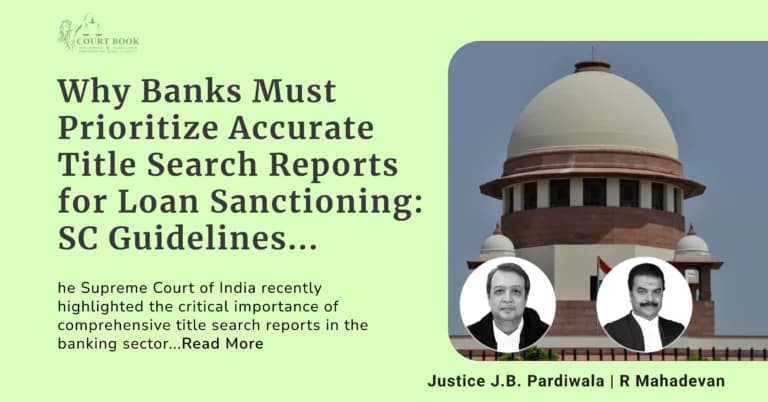The Supreme Court of India recently highlighted the critical importance of comprehensive title search reports in the banking sector. This directive is aimed at preventing legal disputes and safeguarding public funds during the loan sanctioning process. The Court emphasized the need for stringent measures and collaboration between the Reserve Bank of India (RBI) and other stakeholders to standardize title search practices.
Supreme Court’s Observation on Loan Sanctioning Practices
In a case involving the Central Bank of India and disputed property transactions, the Supreme Court underscored the risks of relying on inadequate and low-quality title clearance reports. These reports, often prepared for minimal fees, can lead to grave legal and financial implications for banks and borrowers alike.
Justice J.B. Pardiwala and Justice R. Mahadevan, presiding over the bench, noted:
“Banks should remain very careful with inadequate title clearance reports, more particularly, when such reports are obtained cheaply and at times for external reasons. This concerns the protection of public money and is in the larger public interest. Therefore, it is essential for the Reserve Bank of India and other stakeholders to collaborate in developing a standardized and practical approach for preparing title search reports.”
Significance of Title Search Reports
- Preventing Fraudulent Transactions A thorough title search ensures that ownership is verified, adverse claims are identified, and the property’s legal status is confirmed. This reduces the risk of fraudulent transactions.
- Avoiding Legal Disputes The absence of a robust title clearance process can result in complex legal battles, as seen in the case where disputed property was mortgaged without proper verification.
- Protecting Public Funds Faulty title reports jeopardize public money, as banks may sanction loans on contested properties. Ensuring quality in these reports safeguards the financial system.
The Role of the RBI and Stakeholders
The Supreme Court urged the RBI to take a proactive role in creating a standardized framework for title search reports. This framework should include:
- Guidelines for Report Preparation: Establishing criteria for high-quality, reliable title search reports.
- Fee Standardization: Introducing uniform charges to maintain consistency and transparency.
- Accountability of Bank Officials: Defining the liability, including potential criminal action, for officers who approve loans based on faulty reports.
Key Judicial References
The Court referred to previous rulings to substantiate its observations:
- Electrosteel Castings Ltd. v. UV Asset Reconstruction Co. Ltd. (2022): Highlighted that mere allegations of fraud do not suffice to bypass jurisdictional limitations.
- Harshad Govardhan Sondagar v. International Assets Reconstruction Co. Ltd. (2014): Discussed the limitations of the Debts Recovery Tribunal in examining earlier sale deeds.
These cases underline the necessity for banks to rely on solid legal frameworks and accurate reports.
Case Summary: Central Bank of India v. Prabha Jain
The case revolved around disputed property transactions where the plaintiff claimed illegal division and sale of inherited land. The bank, unaware of the title disputes, sanctioned loans against the mortgaged property. The Supreme Court ultimately upheld the High Court’s decision, emphasizing the need for civil suits to resolve such issues expeditiously.
Conclusion and Recommendations
The Supreme Court’s directive is a wake-up call for banks to revamp their title search processes. Collaboration between the RBI and stakeholders to implement standardized guidelines will:
- Reduce fraudulent transactions.
- Ensure legal compliance.
- Protect public funds.
A robust and transparent system will not only streamline property transactions but also fortify trust in the financial system.















